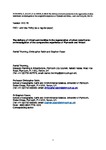The delivery of mixed communities in the regeneration of urban waterfronts: an investigation of the comparative experience of Plymouth and Bristol
| dc.contributor.author | Thorning, D | |
| dc.contributor.author | Balch, C | |
| dc.contributor.author | ESSEX, Stephen | |
| dc.date.accessioned | 2019-03-25T16:22:51Z | |
| dc.date.issued | 2019-05 | |
| dc.identifier.issn | 0264-8377 | |
| dc.identifier.issn | 1873-5754 | |
| dc.identifier.uri | http://hdl.handle.net/10026.1/13536 | |
| dc.description.abstract |
The raison d’être of spatial planning is to secure public benefits or goods through the regulation of private development. Under neoliberalism, where economic growth is privileged over community interests, the ability of planning to deliver public goods can be compromised. The aim of this research was to investigate the delivery of mixed communities in the regeneration of waterfront sites in two outwardly comparable, but in detail, rather different port cities, namely Plymouth and Bristol. The range of dwelling types, extent of affordable housing and associated practicalities of delivery were evaluated using planning application data, 2000–2017 and semi-structured interviews with key stakeholder groups (local planning authority [LPA] officers, developers, land agents and politicians). The results indicate that there is a standard ‘model’ of delivery for port regeneration with city centre harbour-side land yielding high density apartment developments and with houses becoming the prevelent house type in suburban waterfront locations. Planning policies for social mixing have not, in general, been successfully implemented in waterfront sites due to the greater priority afforded to development viability and the political pressure to unlock and accelerate economic growth. The exception to these findings was where public land had been used. For both cities, just two per cent of the dwellings delivered on privately procured sites were affordable housing units compared to over 25% on public land. This paper highlights the effect of neoliberalisation on the English planning system, which enables developers to acquire sites without regard to local development plan policies. Such policies allow developers and landowners to negate planning obligations to provide affordable housing to the detriment of public good and trust in the system. | |
| dc.format.extent | 238-251 | |
| dc.language | en | |
| dc.language.iso | en | |
| dc.publisher | Elsevier | |
| dc.rights | Attribution-NonCommercial-NoDerivatives 4.0 International | |
| dc.rights | Attribution-NonCommercial-NoDerivatives 4.0 International | |
| dc.rights | Attribution-NonCommercial-NoDerivatives 4.0 International | |
| dc.rights | Attribution-NonCommercial-NoDerivatives 4.0 International | |
| dc.rights.uri | http://creativecommons.org/licenses/by-nc-nd/4.0/ | |
| dc.rights.uri | http://creativecommons.org/licenses/by-nc-nd/4.0/ | |
| dc.rights.uri | http://creativecommons.org/licenses/by-nc-nd/4.0/ | |
| dc.rights.uri | http://creativecommons.org/licenses/by-nc-nd/4.0/ | |
| dc.subject | Mixed communities | |
| dc.subject | Urban renaissance | |
| dc.subject | Waterfront regeneration | |
| dc.subject | Planning obligations | |
| dc.title | The delivery of mixed communities in the regeneration of urban waterfronts: an investigation of the comparative experience of Plymouth and Bristol | |
| dc.type | journal-article | |
| dc.type | Journal Article | |
| plymouth.author-url | https://www.webofscience.com/api/gateway?GWVersion=2&SrcApp=PARTNER_APP&SrcAuth=LinksAMR&KeyUT=WOS:000465365000022&DestLinkType=FullRecord&DestApp=ALL_WOS&UsrCustomerID=11bb513d99f797142bcfeffcc58ea008 | |
| plymouth.volume | 84 | |
| plymouth.publication-status | Published | |
| plymouth.journal | Land Use Policy | |
| dc.identifier.doi | 10.1016/j.landusepol.2019.03.019 | |
| plymouth.organisational-group | /Plymouth | |
| plymouth.organisational-group | /Plymouth/Faculty of Science and Engineering | |
| plymouth.organisational-group | /Plymouth/Faculty of Science and Engineering/School of Geography, Earth and Environmental Sciences | |
| plymouth.organisational-group | /Plymouth/REF 2021 Researchers by UoA | |
| plymouth.organisational-group | /Plymouth/REF 2021 Researchers by UoA/UoA14 Geography and Environmental Studies | |
| plymouth.organisational-group | /Plymouth/Research Groups | |
| plymouth.organisational-group | /Plymouth/Research Groups/Centre for Research in Environment and Society (CeRES) | |
| plymouth.organisational-group | /Plymouth/Research Groups/Centre for Research in Environment and Society (CeRES)/CeRES (Reporting) | |
| plymouth.organisational-group | /Plymouth/Research Groups/Marine Institute | |
| plymouth.organisational-group | /Plymouth/Users by role | |
| plymouth.organisational-group | /Plymouth/Users by role/Academics | |
| dcterms.dateAccepted | 2019-03-15 | |
| dc.rights.embargodate | 2020-3-24 | |
| dc.identifier.eissn | 1873-5754 | |
| dc.rights.embargoperiod | Not known | |
| rioxxterms.versionofrecord | 10.1016/j.landusepol.2019.03.019 | |
| rioxxterms.licenseref.uri | http://creativecommons.org/licenses/by-nc-nd/4.0/ | |
| rioxxterms.licenseref.startdate | 2019-05 | |
| rioxxterms.type | Journal Article/Review |



